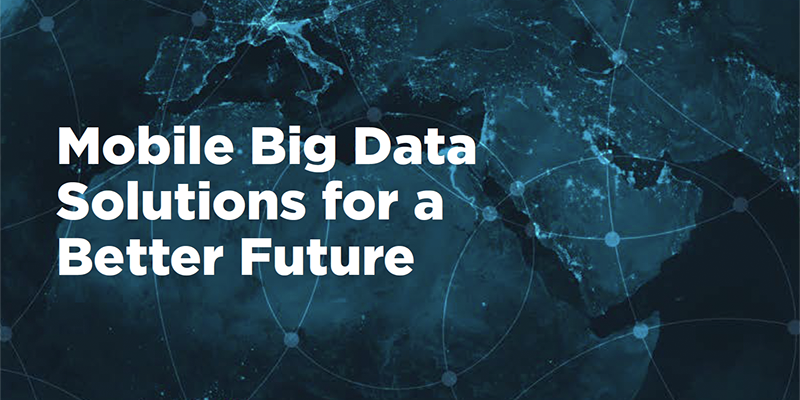Potential for Big Data Solutions to Positively Impact 150 Million Lives Over Next Five Years
Los Angeles: The use of mobile big data solutions in areas such as disaster response, disease prevention and financial inclusion could positively impact more than 150 million people over the next five years, according to a new GSMA study. The new study, Mobile Big Data Solutions for a Better Future, is prepared by PricewaterhouseCoopers (PwC) on behalf of the GSMA. It outlines how advanced mobile network analytics and AI can be applied to drive societal impacts supporting the UN Sustainable Development Goals (SDGs).
“The unparalleled reach of mobile networks across the globe provides a unique opportunity to use mobile big data solutions to solve problems and save lives,” said Mats Granryd, Director General of the GSMA. “Harnessing the power of data analysis and AI to unlock valuable new insight will require investment, innovation and collaboration across a range of stakeholders, including government agencies, development organisations and mobile operators. Our new study highlights the amazing potential from leveraging these tools for social good, establishing the case for investments in mobile big data capabilities and implementations.”
Click here to download the report
The new report includes an analysis of five cases where mobile big data solutions could have a significant impact. A detailed methodology describing how the potential impacts have been calculated is outlined in the full report.
Access to healthcare (SDG #11)
- 60 million people could have better access to healthcare due to more informed infrastructure planning via mobile big data solutions that target health facility deployment planning.
Managing air pollution (SDG #13)
- 120,000 lives could be saved across the world’s most populated cities as a result of better-informed measures to limit air pollution, resulting in lower congestion and better transport planning.
Disaster response (SDG #13)
- More than 25,000 lives could be saved from natural disasters in major at-risk countries by 2025 as a result of mobile big data solutions being able to aid quicker evacuation from dangerous areas.
Disease prevention (SDG #3)
- Communicable diseases could be significantly reduced from spreading by targeting locations at risk of exposure through mobile big data solutions to understand population movements. This could result in 650,000 fewer cases of tuberculosis alone in the next five years.
Financial inclusion (SDG #10)
- 70 million more adults could take up financial services in countries with large ‘unbanked’ populations as a result of mobile big data solutions targeting groups to raise awareness, trust and confidence in digital financial services.
What is mobile big data?
Large volumes of network data are created in mobile networks as a result of the daily functions of providing network connectivity and delivering communication services. This includes information on user location, social networks, profile data, usage and spend. Mobile operators can take this complex raw data and apply advanced analytics and AI to provide governments with invaluable aggregated insights and tools that form lifesaving solutions.
Unlocking the vast potential of big data analytics must be achieved in a way that respects privacy and fosters an environment of trust. The mobile industry is committed to using data responsibly – in a way that protects privacy whilst also spurring innovation. To address privacy and ethics concerns in the specific context of Big Data for Social Good, the GSMA has developed a document identifying privacy considerations related to big data and a set of principles promoting the ethical development and application of AI.
The GSMA’s Big Data for Social Good initiative was launched in February 2017 and is today backed by 20 mobile operators with a presence in 117 markets around the world. The initiative has enabled mobile operators to jointly establish a holistic framework and approach to developing sustainable, replicable solutions that can help public agencies and NGOs tackle epidemics, natural disasters and environmental crises. The initiative has overseen a number of successful mobile big data projects. All our latest insights, recommendations and case studies can be found in the GSMA Big Data for Social Good digital toolkit.
-ENDS-
About the GSMA
The GSMA represents the interests of mobile operators worldwide, uniting more than 750 operators and nearly 400 companies in the broader mobile ecosystem, including handset and device makers, software companies, equipment providers and internet companies, as well as organisations in adjacent industry sectors. The GSMA also produces the industry-leading MWC events held annually in Barcelona, Los Angeles and Shanghai, as well as the Mobile 360 Series of regional conferences.
For more information, please visit the GSMA corporate website at www.gsma.com. Follow the GSMA on Twitter: @GSMA.
Media Contacts:
For the GSMA:
Alicia Bardaro
[email protected]
+1 617 520 7015
GSMA Press Office
[email protected]


